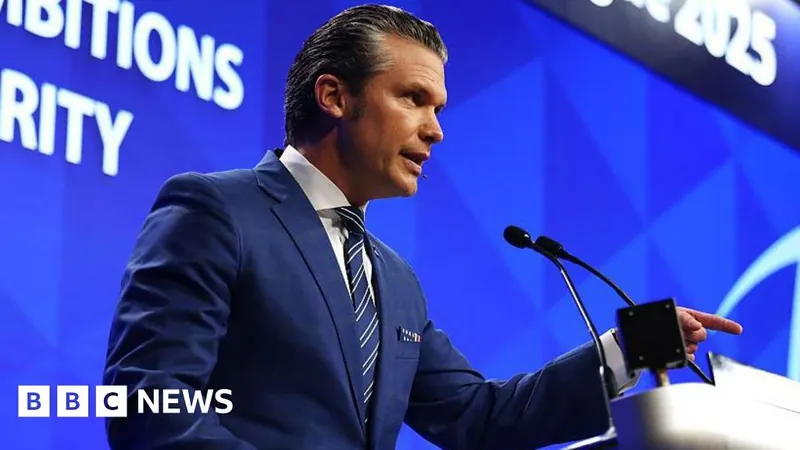
China’s Threat to Taiwan: Urgent Call for Enhanced Defense in Asia
2025-06-01
Author: Ming
A Stark Warning from US Defense Secretary
In a bold address at the Shangri-La Dialogue in Singapore, US Secretary of Defense Pete Hegseth issued a stark warning about the looming threat China poses to Taiwan, describing it as 'imminent.' He emphasized the necessity for Asian nations to bolster their defense budgets and collaborate with the US in thwarting potential military aggression.
The US Stance on Asia
Hegseth clarified that the US does not aim to dominate or isolate China but will firmly stand by its allies in Asia. In a region rife with anxieties over Chinese ambitions, he underscored that the US will not be intimidated or pushed out.
China’s Provocative Response
In response, China accused the US of being the 'biggest troublemaker' in regional peace efforts. The tension grows as Beijing eyes Taiwan, a self-ruled island it claims as its own, and has not shied away from threatening military action.
Preparing for Conflict
Hegseth noted that China is preparing for potential military action, referencing a 2027 timeline that US officials suggest points to when China’s military might be ready to invade Taiwan. He characterized China's ambitions as a quest for hegemony over Asia, particularly in the South China Sea, where territorial disputes with neighboring countries have intensified.
Imminent Consequences
Stating that any attempt by China to forcibly take Taiwan would have 'devastating consequences' not just for the Indo-Pacific but for the world, Hegseth conveyed a seriousness in the situation. 'The threat China poses is real—and it could be imminent,' he stated.
US and Asian Allies: The Call for Action
Hegseth urged Asian allies to significantly increase their defense spending, drawing parallels with European nations who are enhancing their military capacities amid perceived threats. He noted the importance of a 'strong shield of deterrence' formed through unity with allies.
China’s Strategic Retreat?
Despite this backdrop, China appeared to strategically reduce its presence at the dialogue, sending a lower-level delegation than usual and canceling a planned speech. This move raised eyebrows, as no official reason was provided.
The Indo-Pacific Partnership
Promising collaboration, Hegseth outlined US plans for a new Indo-Pacific partnership focused on defense resilience, which will enhance regional cooperation in military technology and manufacturing.
Reckoning With Alliances
However, as international dynamics shift, Hegseth's comments draw mixed reactions from US lawmakers. Some appreciate the focus on deterrence against China while others criticize the language and approach, arguing for a more inclusive partnership model where US allies are not depicted as dependents.
The Broader Dialogue of Defense
As the dialogue unfolds, representatives stress the importance of maintaining freedom of navigation and regional stability in the face of aggressive actions from China. Asian countries seem divided in their perceptions of the Chinese threat, with many still willing to engage economically, despite security concerns.
Conclusion: A Call to Arms?
With tensions high and the stakes even higher, the call for increased defense spending in Asia resonates deeply amidst an evolving geopolitical landscape. As nations navigate their strategies in light of China’s ambitions, the path forward remains uncertain yet critical.





 Brasil (PT)
Brasil (PT)
 Canada (EN)
Canada (EN)
 Chile (ES)
Chile (ES)
 Česko (CS)
Česko (CS)
 대한민국 (KO)
대한민국 (KO)
 España (ES)
España (ES)
 France (FR)
France (FR)
 Hong Kong (EN)
Hong Kong (EN)
 Italia (IT)
Italia (IT)
 日本 (JA)
日本 (JA)
 Magyarország (HU)
Magyarország (HU)
 Norge (NO)
Norge (NO)
 Polska (PL)
Polska (PL)
 Schweiz (DE)
Schweiz (DE)
 Singapore (EN)
Singapore (EN)
 Sverige (SV)
Sverige (SV)
 Suomi (FI)
Suomi (FI)
 Türkiye (TR)
Türkiye (TR)
 الإمارات العربية المتحدة (AR)
الإمارات العربية المتحدة (AR)